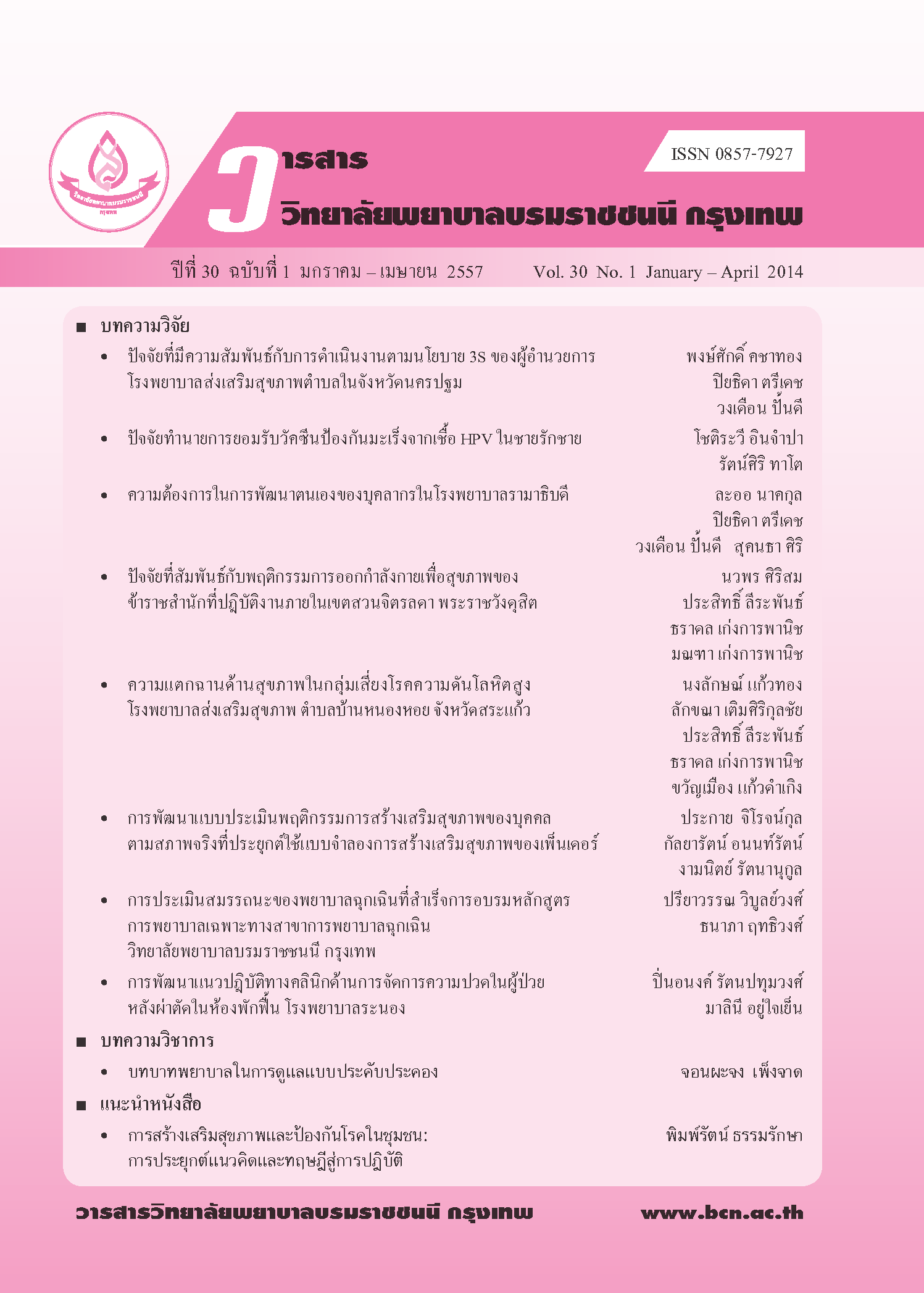การพัฒนาแบบประเมินพฤติกรรมการสร้างเสริมสุขภาพของบุคคลตามสภาพจริงที่ประยุกต์ใช้ แบบจำลองการสร้างเสริมสุขภาพของเพ็นเดอร์ Development of an authentic health promotion behaviors assessment tool using Pender’s Health Promotion Model
คำสำคัญ:
แบบประเมินพฤติกรรมการสร้างเสริมสุขภาพ, แบบจำลองการสร้างเสริมสุขภาพของเพ็นเดอร์บทคัดย่อ
บทคัดย่อ
การวิจัยและพัฒนานี้ มีวัตถุประสงค์เพื่อพัฒนาแบบประเมินพฤติกรรมการสร้างเสริมสุขภาพของบุคคลในบริบทของครอบครัวและชุมชนตามสภาพการณ์จริงดำเนินการควบคู่ไปกับการเรียนการสอนภาคปฏิบัติวิชาการสร้างเสริมสุขภาพ ของนักศึกษาพยาบาลศาสตร์ ชั้นปีที่ 2 ในชุมชนริมคลองแห่งหนึ่งกลุ่มตัวอย่าง คือ ประชาชนวัยต่างๆที่เป็นกรณีศึกษาของนักศึกษา จำนวน 72 คน
กระบวนการพัฒนาเริ่มจากการสำรวจชุมชนเบื้องต้น เพื่อนำข้อมูลที่ได้มา ผนวกกับแนวคิดทฤษฎีที่ใช้อธิบายพฤติกรรมการสร้างเสริมสุขภาพของบุคคล และเครื่องมือประเมินสภาวะสุขภาพชุมชน มากำหนดเป็นประเด็นหรือหัวข้อที่จำเป็นสำหรับการประเมินการสร้างเสริมสุขภาพและการป้องกันการเจ็บป่วยของบุคคล ในบริบทของครอบครัวและชุมชนตามสภาพการณ์จริง ประกอบด้วย 1) ข้อมูลทั่วไปของครอบครัว 2) ข้อมูลสิ่งแวดล้อมภายในและภายนอกบ้าน 3) ระบบสุขภาพครอบครัว และ 4) การประเมินภาวะสุขภาพและพฤติกรรมสุขภาพของบุคคล จากนั้นได้นำแบบประเมินที่พัฒนาขึ้นไปให้นักศึกษาพยาบาล ห้องที่ 1 จำนวน 72 คน ใช้ในการรวบรวมข้อมูลจากกรณีศึกษาภายใต้การนิเทศของอาจารย์ประจำกลุ่ม นักศึกษา 2 คนต่อกรณีศึกษา 1 คนเมื่อเสร็จสิ้นการฝึกผู้วิจัยได้สัมภาษณ์อาจารย์ประจำกลุ่มและตัวแทนนักศึกษาเกี่ยวกับการใช้แบบประเมินและนำมาปรับปรุงก่อนนำไปใช้กับนักศึกษาห้องที่ 2จำนวน 72 คนด้วยวิธีการเดียวกัน การวิเคราะห์ข้อมูลใช้การตีความและสร้างข้อสรุปแบบอุปนัย จากรายงานกรณีศึกษาของนักศึกษา
ผลการวิเคราะห์ข้อมูล สรุปได้ว่า แบบประเมินที่ได้พัฒนาขึ้นช่วยให้นักศึกษาสามารถนำไปใช้ในการรวบรวมข้อมูลเกี่ยวกับพฤติกรรมการสร้างเสริมสุขภาพ ของกรณีศึกษาได้ทุกวัย ทำให้ได้ข้อมูลเชิงลึกถึงเหตุผล หรือ ปัจจัยที่อยู่เบื้องหลังพฤติกรรม รวมทั้งความรู้สึก หรือทัศนคติของกรณีศึกษา นอกจากนั้นยังช่วยให้นักศึกษาได้รู้จักสังเกต และเก็บรวบรวมข้อมูล ครอบคลุมปัจจัยด้านสิ่งแวดล้อม ทั้งบริเวณภายในบ้าน รอบบ้าน และในชุมชนซึ่งมีผลต่อสุขภาพ
Abstract
This paper presents a research and development of an authentic health promotion behaviors assessment tool, which was carried out along with the practicum of Year II nursing students at a canal-side community. The participants were 72 community dwellers of various ages who agreed to be students’ case studies.
The development process based on the information obtained from a preliminary community survey and a literature review on health promotion behaviors and community health assessment tools. The aspects necessary for developing a health promotion behaviors assessment tool in an authentic context of the family and the community were identified. The aspects included 1) demographic data of the family, 2) environment inside and outside of the house, 3) family health system; and 4) health status and health behaviors of the person.
The initially developed assessment tool was used, by 72 students in the first class, to collect data of their studied cases in various age groups under the supervision of their nursing instructors. Two students were responsible for one case. At the completion of the practicum course, the instructors and students were interviewed in groups about their opinions towards the utilization of the developed assessment tool. The tool then was improved according to their comments and reused with another 72 students in the second class. Students’ work was marked and handed in to the researchers for data analysis with students’ permission, after grading process was completed. Twenty one studied cases were analyses using analytical induction analyses.
The analyses showed that the developed assessment tool was helpful to the students in collecting in-depth data regarding health promotion behaviors of persons covering nutrition, physical activities, health responsibility, stress management, interpersonal relationships, and spiritual development, with reasons or factors behind the behaviors and the subjects’ attitudes. The tool was applicable for data collection of all age groups.
Downloads
ดาวน์โหลด
เผยแพร่แล้ว
รูปแบบการอ้างอิง
ฉบับ
ประเภทบทความ
สัญญาอนุญาต
บทความที่ได้รับการตีพิมพ์ เป็นลิขสิทธิ์ของวารสารวิจัยสุขภาพและการพยาบาล (วิทยาลัยพยาบาลบรมราชชนนี กรุงเทพ) ไม่สามารถนำไปตีพิมพ์ซ้ำในวารสารฉบับอื่น


















